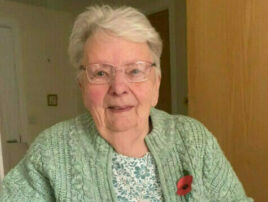Wednesday 6th January 2021
Coping with Grief and Loss - Q&A
We spoke to Louise Morse about how she hopes her new booklet will help people to reflect on grief, understand it better and find ways to live through it

What prompted you to write Coping with Grief and Loss?
All my work, writing or speaking, is to help people understand and cope with the challenges in their lives. Coping with Grief and Loss is written within a Christian context: I believe that without Christian spiritual insight, any help or understanding offered lacks vital, foundational truth. I write mainly for seniors who, because they have lived long lives, are more likely than others to have known bereavements. Many are the ‘stiff upper lip’ generation, who are learning only now (mainly from the younger generation) how to share emotions such as grief. Reading how grief has affected others, physically and emotionally, normalises our own experience.
Learning what we can do helps at the most turbulent, unpredictable time in our lives.
In your first chapter, you talk about a ‘conspiracy of silence’ around death. Why do we need to break that silence?
Death stirs up visceral, painful emotions. It has a finality unlike anything else: we can’t avoid it or reverse it. Talking about it brings up uncomfortable emotions – so we push it away. When it is discussed openly, we can look through death to the life Christ has won for us beyond. 1 Corinthians 15:55 says, “O death, where is your victory? O death, where is your sting?” When we talk about death in the light of the gospel the Holy Spirit brings comfort and hope.
The booklet introduces the idea of ‘stepping stones’ as a way through grief. Why is that such a helpful image?
They’re a metaphor for the actions and beliefs that we can stand on that will hold us steady on the grief journey. The stepping stones also give a sense of progression. It’s important to know that there is progress in grief; that you will come through it.
In the booklet, there is a chapter on dementia caregiving and grief. Why was it important for you to include this?
From my research I’ve found that grief is the most damaging component of dementia caregiver burden. Dementia caregivers live with grief sometimes for years, as they experience loss after loss. I hope this book helps provides practical and spiritual help for those who are recently bereaved, and for those supporting them. Others will find in it truths that will enrich them not only in bereavement, but throughout life.
Coping with Grief and Loss is priced £3 and available to buy now


































